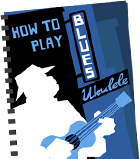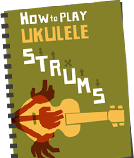If you’re looking for an extensive and accurate guide, take a look at John King’s Nalu Music.
The story of the ukulele starts in Europe. By the 18th Century stringed, fretted instruments had a long history. Larger instruments such as guitars and lutes had developed smaller cousins of particular benefit for sea-faring musicians. In Portugal the guitar had shrunk down to became a machete – retaining the figure of 8 shape despite the size making it redundant.
In 1879 the Ravenscrag set off for Hawaii with four Portuguese cabinet makers on board. The market for large, ornate Portguese furniture amongst Hawaii’s largely poor and agrarian population presumably not being large enough to support them all, the four started to make instruments. The one that took hold was the machete in a new form.
The truth behind much ukulele mythology that surrounds the ukulele – where it got its name, the tuning and ‘my dog has fleas’ – is mostly lost to us. What is true is that the uke became a big hit with the Hawaiian Royal Family and the Hawaiians in general and had become firmly established as their instrument by the start of the 20th Century.
After the US’s annexation of Hawaii – or when the, “business men stole Hawaii from the Hawaiians” as Bob Brozman puts it – the new owners were keen to sell it on to mainland America as a dream tropical island. Their big push was the Panama Pacific international Exposition in 1915. Their show included plenty of ukulele music and featured the ukuleles of Jonnah Kumalae. It sparked the original ukulele boom in the 1920s amoungst people dreaming of a mythical island getaway.
The ukulele started to move away from purely a Hawaiian novelty and became such a part of music making that by the start of the 30s most piano scores featured ukulele chord diagrams. Thanks to Ukulele Ike, the uke’s image turned almost 180 degrees to become associated with smoky bars, trilbies and jazzy songs.
When Wall Street collapsed in 1928 the economy and the uke’s popularity in the US took a big dive.
However, the uke – in it’s louder, harsher banjolele form – started growing in popularity in music halls of the UK. The biggest star of the era was George Formby whose banjolele strumming was the sound of the Second World War.
WWII also provided an impetus for the revival of the ukulele in the US. Troops returned with souvenier ukuleles from Hawaii and the islands’ accession to offical US statehood proved the perfect occasion for a celebratory strumming.
The booming consumer economy of 1950’s US saw mass produced plastic goods flooding shops. The ukulele was a prime instrument for mass selling to kids and – jazz guitar manufacturer – Maccaferri jumped on the opportunity with their ranges of plastic ukes.
This was bolstered by the use of the ukulele by huge TV star Arthur Godfrey and the second ukulele boom came into being.
The rather less aspirational figure of Tiny Tim was the soundtrack to the uke’s crashing popularity in the 60s and 70s.
For most of the 90s alternative music scene was dominated by traditional guitar bands and, as a reaction to this, the first decade of the 200s saw a growing acoustic alternative scene using more eclectic sounds and more unusual instrumentation. The ukulele found its place in this sound with bands like Beirut and The Magnetic Fields.
Two huge trends that helped bring the ukulele back to popularity were the proliferation of the internet and the huge increase in imports from China and the East. The internet has put ukulele music in front of people and has created a groundswell growth of people being inspired to pick up the instrument by others like themselves who are playing for their own enjoyment rather than superstardom.



Thanks for this Woodshed, I have always wanted to know this stuff. Some of the paragraphs end rather unexpectedly though…